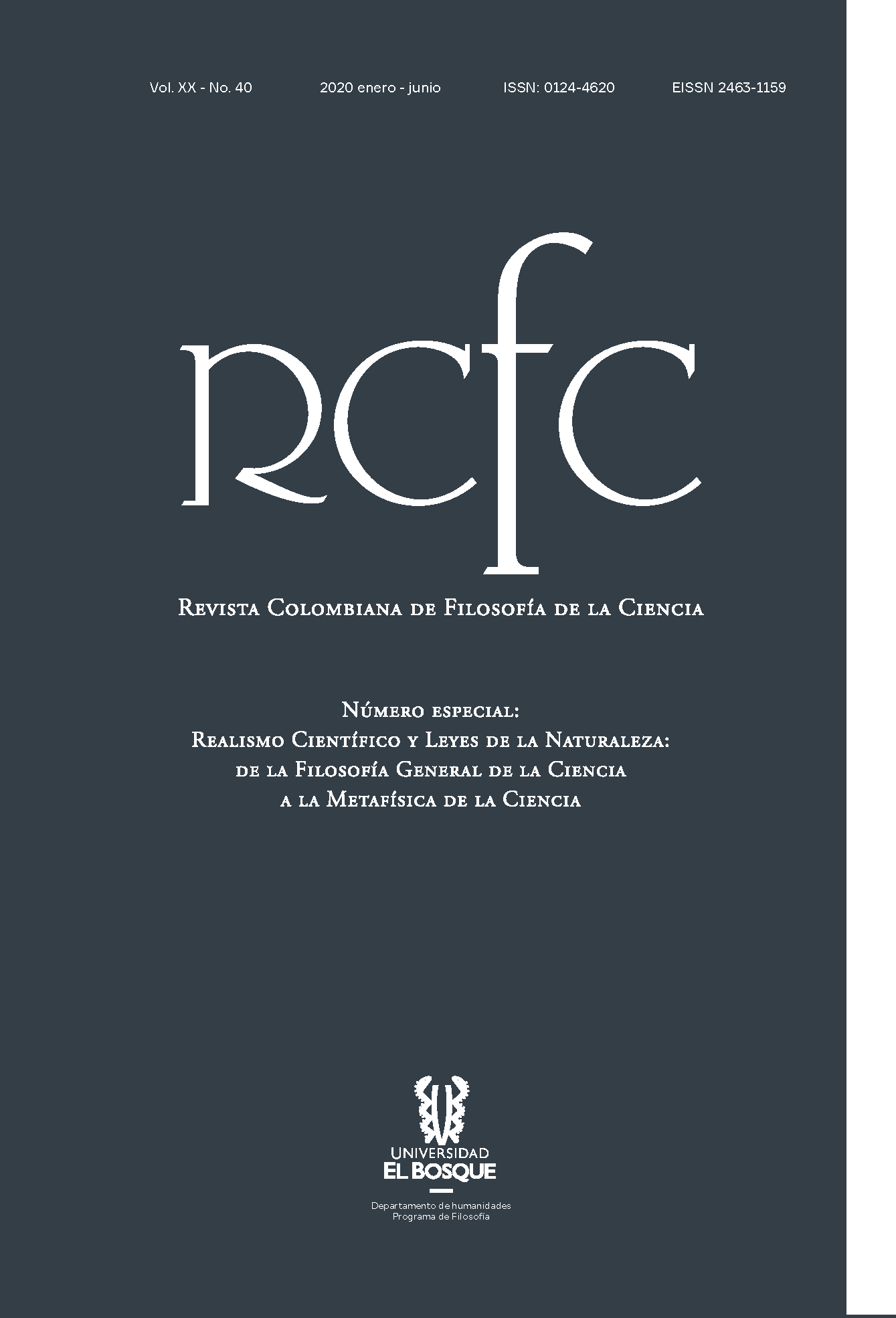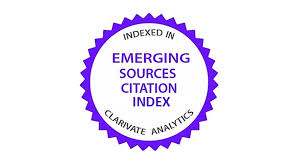Los experimentos mentales como modelos científicos
DOI:
https://doi.org/10.18270/rcfc.v20i40.3237Palabras clave:
experimentos mentales, modelos, idealización, límites ideales, representación científicaResumen
El propósito de este trabajo es proporcionar una explicación novedosa sobre el funcionamiento de los experimentos mentales en física. Propongo que gracias a esta clase de experimentos es posible realizar inferencias acerca del comportamiento de los fenómenos y extraer conclusiones que explican aspectos del mundo físico a partir de la teoría relevante. Los escenarios imaginarios describen casos idealizados que funcionan como límites ideales de los fenómenos concretos. Este punto de vista asume un compromiso realista mínimo que reside en afirmar que los experimentos mentales representan aspectos del mundo porque permiten obtener conocimiento aproximadamente verdadero acerca de los fenómenos físicos o, en otras palabras, los experimentos mentales representan porque Las conclusiones que se infieren del modelo se aplican a sistemas reales.
Descargas
Referencias bibliográficas
Brendel, Elke. “Intuition Pumps and the Proper Use of Thought Experiments”. Dialectica 58.1 (2004): 89-108.
Brown, James. The Laboratory of the Mind: Thought Experiments in the Natural Sciences. 2.nd ed. London: Routledge, 2011.
Cartwright, Nancy. How the Laws of Physics Lie. Oxford: Oxford University Press, 1983.
______. “Models and the Limits of Theory: Quantum Hamiltonians and the BCS Models of Superconductivity”. Models as Mediators. Eds. Mary Morgan y Margaret Morrison. Cambridge: Cambridge University Press, 1999. 196-240.
Cassini, Alejandro. “Modelos, idealizaciones y ficciones: Una crítica del ficcionalismo”. Principia 17. 3 (2013): 345-364.
Clatterbuck, Hayley. “The Epistemology of Thought Experiments: A Non-eliminativist, Non-platonist Account”. European Journal of Philosophy of Science 3.1 (2013) 309-329.
Cohen, Martin. Wittgenstein’s Beetle and Other Classic Thought Experiments. Oxford: Blackwell, 2005.
Cooper, Rachel. “Thought Experiments”. Metaphilosophy 36.1 (2005): 328 -347.
Frigg, Roman. “Scientific Representation and the Semantic View of Theories”. Theoria 55.1 (2006): 37-53.
Galileo. Discorsi e dimostrazione matematiche intorno a due nuove science. 1638. [Two New Sciences]. Trad. al inglés de Stillman Drake. Madison: University of Wisconsin Press, 1974.
Galileo. Dialogue Concerning the Two Chief World Systems. Trad. al inglés de Stillman Drake. 2nd revised ed. Berkeley: University of California Press, 1967.
Gendler, Tamar. Thought Experiment: On the Power and Limits of Imaginary Cases. London: Routledge, 2000.
Häggqvist, Soren. Thought Experiments in Philosophy. Stockholm: Almqvist & Wiksell International, 1996.
Halley, Edmund. “On the Force of Light and its Propagation in the Ether and the Distances to the Fixed Stars”. 1744. Darkness at Night: A Riddle of the Universe. Ed. Edward Harrison. Cambridge: Harvard University Press, 1987. 221-222.
Humphreys, Paul Extending Ourselves: Computational Science, Empiricism, and Scientific Method. New York: Oxford University Press, 2004.
Koyré, Alexandre. Études dhistoire de la penseé scientifique, Paris, Gallimard [1973]. Trad. española: Estudios de historia del pensamiento científico, México: Siglo XXI, 1987. 206-257.
Koyré, Alexandre. “Galileo’s Treatise ‘De Motu Gravium’: The Use and Abuse of Imaginary Experiment”. Metaphysics and Measurement. London: Chapman and Hall, 1968. 44-88.
Ladyman, James. “Idealization”. Philosophy and Philosophy of Science. Eds. Stathis Psillos y Martin Crud. New York: Routledge, 2008. 358-366.
Laymon, Ronald. “Thought Experiments by Stevin, Mach and Gouy: Though Experiments as Ideals Limits and as Semantics Domains”. Thought Experiments in Science and Philosophy. Eds. Tamara Horowitz y Gerald Massey. Savage: Rowman and Littlefield, 1991. 167-191.
Lenhard, Johannes “Thought Experiments and Simulation Experiments: Exploring Hypothetical Worlds”. The Routledge Companion to Thought Experiments. Eds. James Brown, James, Michael Stuart y Yiftach Fehige. London: Routledge, 2018. 554-567.
Maxwell, James. Theory of Heat. London: Longman, 1871.
McMullin, Ernan. “Galilean Idealization”. Studies in History and Philosophy of Science 16 (1985): 247-273.
Mettini, Guadalupe. “Experimentos mentales y conocimiento a priori”. Praxis Filosófica Nueva Serie 47 (2018): 71-90.
Miščević, Nenad. “Mental Models and Thought Experiments”. International Studies in the Philosophy of Science 6.3 (1992): 215-226.
Morgan, Mary y Margaret Morrison. Models as Mediators. Cambridge: Cambridge University Press, 1999.
Morrison, Margaret. “Models, Measurement and Computer Simulation”. Philosophical Studies 143 (2009): 33-57.
Nersessian, Nancy. “In the Theoretician Laboratory: Thought Experimenting as Mental Modeling”. PSA (1992): 291-301.
Newton, Isaac. Mathematical Principles of Natural Philosophy. 1686. Trans. de Andrew Mott y Florian Cajori. Berkeley: University of California Press, 1934.
Norton, John. “Are Thought Experiments Just What You Thought?” Canadian Journal of Philosophy 26 (1996): 333-366.
Palmieri, Paolo. “Galileo’s Thought Experiments: Projective Participation and the Integration of Paradoxes”. The Routledge Companion to Thought Experiments. Eds. James Brown, Michael Stuart y Yitfach Fehige. London: Routledge, 2018.
Radder, Hans. Ed. The Philosophy of Scientific Experimentation. Pittsburgh: Pittsburgh University Press, 2003.
Reiss, Julian. “Thought Experiments and Idealization”. The Routledge Companion to Thought Experiments. Eds. James Brown, Michael Stuart y Yitfach Fehige. London: Routledge, 2018.
Sorensen, Roy. Thought Experiments. New York: Oxford University Press, 1992.
Suárez, Mauricio. “Deflationary Representation, Inference and Practice”. Studies in History and Philosophy of Science 49 (2015): 36-47.
Weisberg, Michael. “Three Kinds of Idealization”. Journal of Philosophy 104.1 (2007): 639-659.
Weisberg, Michael. Simulation and Similarity. Using Models to Understand the World. New York: Oxford University Press, 2013.











